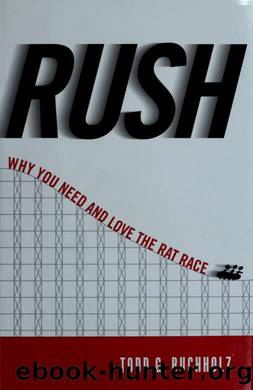Rush by Todd G. Buchholz

Author:Todd G. Buchholz
Language: eng
Format: epub
Tags: Social aspects, Psychology of Movement, Competition, Happiness
Publisher: Hudson Street Press
Published: 2011-07-14T16:00:00+00:00
144 RUSH
Every nighttime local television news show seems to begin with a crime report, and the top-rated television program in the United States, France, and Australia is the same: NCIS (Naval Criminal Investigative Service). Crime sells. From a historical point of view, there is good news, though: Levels of violence in modern communities seem to be dropping over the centuries. Homicide rates in Europe today are perhaps one-tenth the rate of the year AD 1300. And even the rate in AD 1300 Europe is small compared to the rates we find among foraging communities.
So why were premodern tribes apparently so violent and impulsive? They failed to do three things: (1) think sufficiently about tomorrow; (2) figure out how to trade with strangers; (3) develop persuasive moral codes that humanized the stranger.
Before I get into these points, you may be asking, "What does this have to do with work and our search for happiness?" Our best chance for happiness comes when we work hard now, anticipating a better tomorrow. Working for tomorrow looks like a rush, a frenzy of effort that takes us away from the ashram. But evolution, and our neurotransmitters, are all telling us to keep moving, to look to tomorrow.
Neanderthals may have died out because of frigid weather, but then again Homo sapiens appeared around the same time and managed to make it through an Ice Age. I would argue the Neanderthalic brain did not look forward to the same extent and, therefore, did not innovate. Why bother innovating and inventing new tools if you cannot picture them leading to bigger crops or healthier children? At the same time, Neanderthalic "culture" could not figure out how to trade with strangers and how to create moral codes that preserved life.
Work makes people less violent and less impulsive. Those foraging tribes today who labor the fewest hours of the day appear to be the most homicidal. Anthropologists who track foraging tribes report that they tend to work about one-third fewer hours than Europeans. Sometimes they work little because they can achieve subsistence nutrition without working harder. And that is enough for them. This brings to mind E. F. Schumacher's concept of "enoughness." Work less, consume
Download
This site does not store any files on its server. We only index and link to content provided by other sites. Please contact the content providers to delete copyright contents if any and email us, we'll remove relevant links or contents immediately.
Rewire Your Anxious Brain by Catherine M. Pittman(17590)
Talking to Strangers by Malcolm Gladwell(11879)
The Art of Thinking Clearly by Rolf Dobelli(8843)
Mindhunter: Inside the FBI's Elite Serial Crime Unit by John E. Douglas & Mark Olshaker(7834)
Becoming Supernatural by Dr. Joe Dispenza(7107)
Change Your Questions, Change Your Life by Marilee Adams(6641)
The Road Less Traveled by M. Scott Peck(6635)
Nudge - Improving Decisions about Health, Wealth, and Happiness by Thaler Sunstein(6633)
The Lost Art of Listening by Michael P. Nichols(6474)
Enlightenment Now: The Case for Reason, Science, Humanism, and Progress by Steven Pinker(6406)
Win Bigly by Scott Adams(6312)
Mastermind: How to Think Like Sherlock Holmes by Maria Konnikova(6236)
The Way of Zen by Alan W. Watts(5800)
Daring Greatly by Brene Brown(5643)
Grit by Angela Duckworth(4738)
Big Magic: Creative Living Beyond Fear by Elizabeth Gilbert(4723)
Men In Love by Nancy Friday(4327)
Flow by Mihaly Csikszentmihalyi(4053)
The Four Tendencies by Gretchen Rubin(4024)
